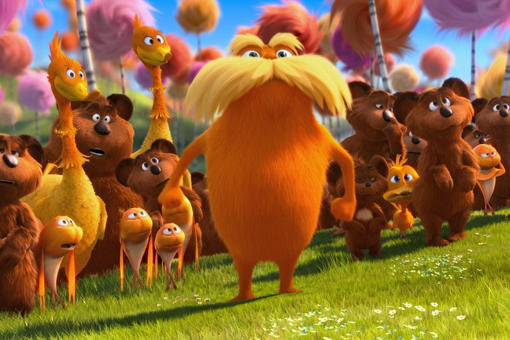By Pam Glazier · March 5, 2012

The Lorax is a film that is an excellent example of a terribly written script. It’s exciting to have an example that so blatantly evinces a writer’s missteps. The voice acting was good, there was no problem with the music, the animation was decent…and even excellent when it came to the unspoken characterizations of the forest creatures that the Lorax (Danny DeVitto) attempts to protect, but the writing—oh god, the writing!
So why was the writing so terrible? Because it had an obvious preachy agenda and it spoke down to its audience to the point where even a two year old could pick up on the patronizing tone. I’ve seen loads of movies made for kids that focused on the story and had an intelligent through-line that seemed to invite thought and discussion around certain issues no matter what your age was. Cloudy with a Chance of Meatballs is one of those stories. The dangers of technology are explored, but without myopically slamming a one-sided argument into everyone’s faces for an hour and a half. The story just happens, and we are invested in the characters and we see how technology helps and hurts them, and then we think about the inherent issues surrounding what happened in the story. The Lorax prefers the opposite method—insisting on propaganda tactics in order to let us know that corporations and tree cutters are evil. Not only does this writing add nothing to the larger global conversation about how to deal with such problems, this writing is literally an affront to a great titan of literature. It is in itself a pollution of conceptuality that shits all over the original Dr. Seuss.
The film starts out with an uninspired musical number about how awesome it is to live in Thneedville because … I don’t even remember the argument of the song. But the basic idea is that it’s a cookie-cutter suburban town that handles its pollution problems through consumerism and ignorance. There are no “yucky” trees in Thneedville because they are modern and fancy and consumerist. Young Ted (Zac Efron) learns that his crush Audrey (Taylor Swift) wants nothing more than a tree. They are so rare, she would obviously marry the heroic man who brought her one. This sets Ted off on his quest. His cool Grammy Norma (Betty White) tells him how to find The Once-ler (Ed Helms) who will tell him how to get a tree.
Ted starts visiting The Once-ler in the deserted wasteland outside the town and learns of how it used to be a beautiful forest until The Once-ler greedily messed everything up. There is an addition to the story made in the form of Mr. O’Hare (Rob Riggle). Mr. O’Hare sells bottled air because the air quality had deteriorated to the point of this being a needed product. O’Hare conspires against Ted because he knows Ted it going to try and cut into his profits by bringing back the trees. Ted, through The Once-ler’s stories, learns how the Lorax tried in vain to get people to care for the environment. Thus the end becomes clear: Ted, moved by The Once-ler’s stories, will enlist the help of his friends to bring back the trees and safeguard the environment—hopefully he can succeed in the face of O’Hare’s opposition.
Do you see what I mean? The structure isn’t that bad. It’s the way in which it was done that is so offensive. Exceedingly heavy handed and one-sided.
So I guess the lesson to be learned here is to stand back. You know those clichéd stereotypes of painters that stand 30 feet away from the canvases they have painted and then they sort of look at them, and then block them out with their thumb, and then look at them again? Well, I am not exactly sure what the hell is going on there, but I assume it has something to do with gaining a perspective on something that you’ve been intimately embroiled in. The writer(s) failed to do just that. There were decently paced sequences, the continuity was ok, but nobody asked if the thing was a preachy mess.
I tend to strongly agree with this quote taken from a NYT review: “The movie’s silliness, like its preachiness, is loud and slightly hysterical, as if young viewers could be entertained only by a ceaseless barrage of sensory stimulus and pop-culture attitude.”
If I were you, I’d save yourself the headache and just watch the original cartoon version from the 70s—or better yet, set yourself down and read the book.